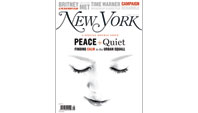
1. The “Peace and Quiet” issue (January 21–28) seemed to have the opposite effect on many readers because of Ayelet Waldman’s “The Bad-Mommy Brigade.” Waldman’s attempt to empathize with, rather than demonize, the struggles of celebrities like Britney Spears to be good parents had the hate mail pouring in. One reader cited her own painful experience of having self- absorbed, inattentive parents: “While Waldman is a talented and often amusing writer, I cannot help but feel very sorry for her children,” wrote Aurora J. “Whether they feel it now or in fifteen years, her easy cop-outs about being a ‘bad mom’ will only end up hurting them.” Then there was a series of charges about all the perspectives that Waldman failed to account for, including those of gay parents, couples who choose not to have children, mothers who “don’t have time to compare ourselves to celebrities, mentally unhinged or otherwise,” and people who are not as financially secure as Waldman. (“At the risk of sounding like John Edwards on the campaign trail,” went a post on nymag.com, “I have to ask: What about working-class and middle-without-the-qualifier-upper-class mothers?”) Oh, yes, it was a good old-fashioned pile-on, but the possibility that there was a mostly silent contingent of readers who admired Waldman’s story was hinted at by this final letter from Minette Herman of Weston, Florida, who wrote, “Ayelet Waldman’s interpretation of Good Mom/Bad Mom personas clearly illustrated the struggle of the stay-at-home mom. It takes inner strength to compromise oneself, but compromise is what is needed in order to be that proverbial good mom. In fact, the same can be said of one who wants to be a good dad, wife, husband, son, daughter, friend. I hate to cut this short, but I have to go get cookies out of the oven before they burn!”

2. Back to John Edwards, for a moment: Our “Reasons to Love New York” issue (December 24–31) aroused some strong working-class passions, specifically the entry “Because we proudly harbor illegal immigrants.” Kevin J. Harty of East Haven, Connecticut, wrote in response: “I was incensed that anyone could be proud of New York as a sanctuary city. It makes so much sense that white collars are all for illegal immigration. Blue-collar non-citizens are gaining ground, while legitimate U.S. blue collars are losing ground.”

3. Coffee is all over the news—it may be worse than we thought for pregnant women, the Times tells us that the Japanese have a superior method for brewing it, McDonald’s and Starbucks are going to war, and on nymag.com’s Grub Street blog, a furious debate erupted over the merits of another chain’s caffeinated offerings (“Rachael Ray Doesn’t Like Dunkin’ Donuts Coffee Any More Than We Do,” January 16). A sampling of the hostilities:
→ “Um, Dunkin’ Donuts’ coffee rules. I resent this.”
→ “You and Rachael Ray have no taste. Dunkin’ Donuts’ coffee rules. Starbucks tastes like burned dog poop.”
→ “Two words: Blueberry coffee. Blueberry fucking coffee?!”
→ “Three words: Dirty dish water.”
→ “The DD lattes are great, but the drip is BLECH!”
→ “They both suck. But coffee ALWAYS tastes better with a DD chocolate glazed doughnut than with a Starbucks ‘scone.’”
→ “With all due respect, this is like trying to pick a side between SARS and Ebola.”
The National Book Critics Circle Awards announced that on March 6 that it will present the prestigious Nona Balakian Citation for Excellence in Reviewing to our book critic Sam Anderson, who, should you wish to read his latest work, has an essay about Jay Leno in this issue.
Correction: Bert Blyleven, who was identified in “The Approval Matrix” (January 21) as Scandinavian, is Dutch.